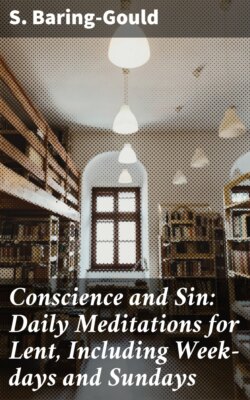Читать книгу Conscience and Sin: Daily Meditations for Lent, Including Week-days and Sundays - S. (Sabine) Baring-Gould - Страница 8
На сайте Литреса книга снята с продажи.
First Saturday in Lent.
ОглавлениеTable of Contents
THE OBLIGATIONS OF CONSCIENCE.
1. As Conscience is a gift of God we are responsible to Him for the use we make of it. Conscience is the moral faculty; as the eyes are organs of the faculty of sight, the ears of the faculty of hearing, so has Conscience the faculty of seeing and knowing and distinguishing right from wrong. As God has given us sight and hearing we exercise these faculties, and, what is more, cultivate them. So, as God has given us the moral faculty, we exercise it, and cultivate it, if we desire to fulfil the ends for which God has created us. God gives us eyes to see our way, and not strike against walls, and fall into pits. So God has given us Conscience to see our moral way, and not run into temptations, and to avoid moral dangers.
2. As Conscience is that interior judgment which God has planted in us to dictate to us what to do, and what to avoid, on special occasions, then, to disobey the voice of Conscience is to disobey the Voice of God. Not only so, but, as Conscience points out to us that a certain course is one to which duty calls us, and we refuse to follow the indication of Conscience, this is a revolt of the will against God, and when the will, knowing what is right, deliberately chooses what is wrong, it commits mortal sin. It was so with Adam and Eve. They knew the Commandment of God, and wilfully went against His Commandment, consequently they had turned away from their proper end, and turned themselves into the camp of rebels against God.
3. When S. Paul says, “Whatsoever is not of faith is sin,” he is speaking of the eating of meats offered to idols; and he shows how that Conscience is the rule as to whether a thing is sinful or not. Idols are naught, so that the things offered to idols are not actually polluted by the oblation; nevertheless, if the Conscience refuses to admit this, and argues that, as a meat has been offered to an idol, the partaking of it is participation in idolatry, then to eat of the meat that has been offered brings guilt on the soul. “He that doubteth is damned if he eat.” (Rom. xiv. 23.)
4. From this we may draw a practical conclusion that it is always well to follow Conscience, even when Conscience, ill-instructed, may be in error; that if Conscience disapprove of a course of conduct, and yet may not understand clearly on what grounds it utters its disapprobation, it is safest, indeed it is right, to obey Conscience, and not take advantage of its hesitation.
That a Conscience may be ill-taught, and therefore in error, that a Conscience may be perverted, we shall see presently; but what appears to be abundantly clear is that it is advisable always to obey Conscience in all things; but then we must be careful to have the Conscience well-instructed, clearly illuminated, so that it may not be hesitating, confused, and liable to direct us wrongly.
5. When Conscience hesitates, and is doubtful between two courses, it is right to seek advice from such as are experienced in the direction of Conscience.
Moreover, the Holy Spirit must be invoked to open the eyes of the understanding, and guide into truth. When hesitation and doubt still remain, then the safest course to adopt is that line of conduct which is likely to entail most trouble, likely to cost us most, least likely to attract notice from others; also, generally, if not always, the simplest and most natural line is the right one; but self-interest, or a disturbed moral sense, may incline one to take another line that is not absolutely wrong in itself, but is less right because less natural, and simple, and direct, and common-place than the other.
